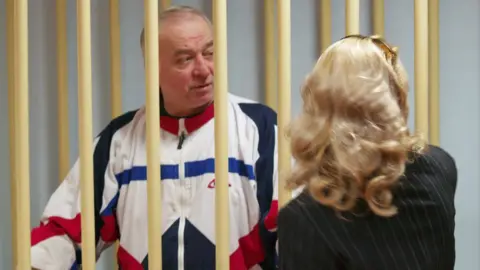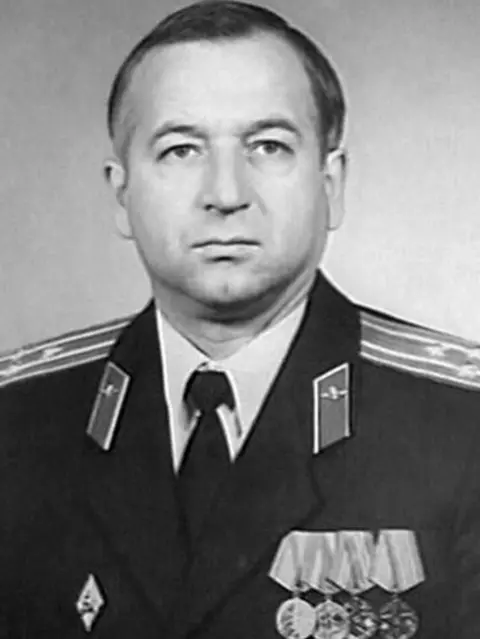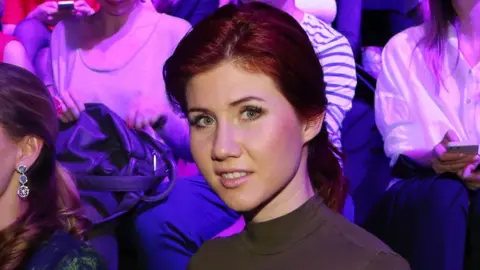Sergei Skripal: Who is the former Russian intelligence officer?
 Moscow District Military Court/TASS
Moscow District Military Court/TASSSergei Skripal is a retired Russian military intelligence colonel who was sentenced in 2006 to 13 years in prison, accused of spying for Britain.
He was convicted, and later pardoned, for passing the identities of Russian secret agents in Europe to the UK's Secret Intelligence Service (MI6).
Russia claimed MI6 had paid him $100,000 for the information, which he had been supplying since the 1990s.
But he was one of four prisoners Moscow swapped for spies in the US in 2010.
Col Skripal was later flown to the UK. He is now 66.
He was found on 4 March slumped on a shopping centre bench in Salisbury, alongside his unconscious 33-year-old daughter Yulia Skripal.
British experts say a military-grade nerve agent developed by the Soviet Union was used to poison them. It is in a class of extremely dangerous secret toxins known as Novichok, they say.
What were the charges against him?
Col Skripal was well regarded during his career in Russia's military intelligence (GRU).
A colleague called him "the life and soul of the party" and added: "All his colleagues respected him. So when he was arrested for spying, it was a real shock."
He was arrested near his home in 2004 and convicted two years later of "high treason in the form of espionage" by Moscow's military court. He was stripped of all his titles and awards.

He was alleged by the Russian security service (FSB) to have been recruited by the British secret services in 1995 while serving in the army.
He exchanged information classified as Russian state secrets with MI6 for money that was transferred to a Spanish bank account, the FSB claimed.
The data on "several dozen" Russian undercover operatives, according to pro-Kremlin daily Izvestiya, was eventually used to put FSB agents under surveillance and then expel them from multiple European countries.
Even after his retirement in 1999, the FSB claimed Col Skripal continued to pass on state secrets.
Col Skripal pleaded guilty at his trial and allegedly confessed while co-operating with investigators, reports said at the time.
Russian media gave a lot of air time to Col Skripal's trial and sentencing. They said 13 years was a light sentence considering the "substantial damage" he had caused to Russian intelligence services.
The daily newspaper Komsomolskaya Pravda said that in Soviet times he would have been shot.
What about the prisoner swap?
In July 2010, Col Skripal was pardoned by Russia's then-President Dmitry Medvedev.
He was later released together with three other individuals serving time in Russian prisons in exchange for 10 Russian spies arrested by the FBI.
Among those released by the US was Anna Chapman, who had previously lived in the UK and gained citizenship.
 Getty Images
Getty ImagesDubbed by the media as "Russia's most glamorous secret agent", she went on to present a weekly show on Russian TV.
Deaths in the family
After a Cold War-style spy swap at Austria's Vienna airport, Col Skripal was given refuge in the UK, where he kept a low profile for eight years.
His wife Liudmila died of cancer in 2012, a year after they had bought a semi-detached home in Salisbury. The Skripals had chosen the Wiltshire city because they believed it to be a good area with a low crime rate, family friends told the BBC.
Two years ago, Col Skripal's older brother died in Russia, and last year, his 43-year-old son Alexander died while on holiday with his girlfriend in the Russian city of St Petersburg. He had been rushed to hospital with liver failure.
Family members were suspicious at the time. But Alexander's aunt Viktoria says he had a longstanding alcohol problem.
She says he took his father's spying conviction very badly and began drinking - a habit that wrecked his first marriage.
Col Skripal's family strongly deny that he was an agent of MI6, insisting he was a patriot and that the case against him was fabricated.
Col Skripal's mother lives in Yaroslavl, north-east of Moscow, with Viktoria and her family.
Both Mrs Skripal and Alexander are buried in Salisbury.
Yulia was visiting from Moscow. She had increased her visits to her father after her brother's death last July.
Father and daughter had visited the two graves before they collapsed.
Yulia lived with her parents and brother in Salisbury after 2010 for several years before returning to the Russian capital because she reportedly missed it.
A talented linguist, Yulia studied English and geography at a Moscow university.
She and her brother were able to travel freely between the UK and Russia, despite their exiled father's situation.
Life in Salisbury
Since settling in Salisbury after the spy swap in 2010, Col Skripal appeared to be leading a relaxed and quiet life although he reportedly went on frequent business trips, the BBC's World Affairs Correspondent Richard Galpin said.
Col Skripal reportedly kept the company of British intelligence agents and was a member of Salisbury's Railway Social Club.
Valery Morozov, another Russian exile living in the UK, said Col Skripal told him he had been doing business, "working mainly in cyber-security".
Mr Morozov said: "I understand he was working for some Russian groups."
Col Skripal last called his mother, who is very ill, in mid-February. He reportedly sounded optimistic, though his family say that after the 2010 spy swap, he was always very vigilant because he believed the Russian special services could come after him at any time.
